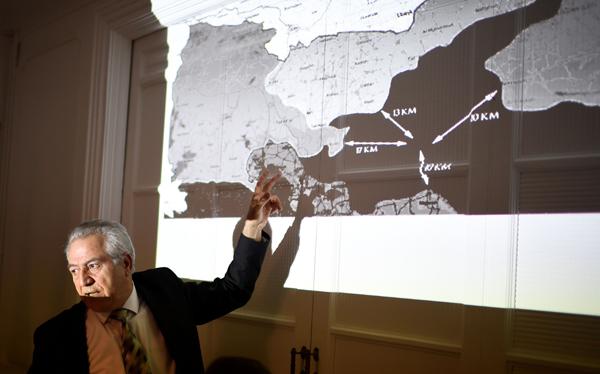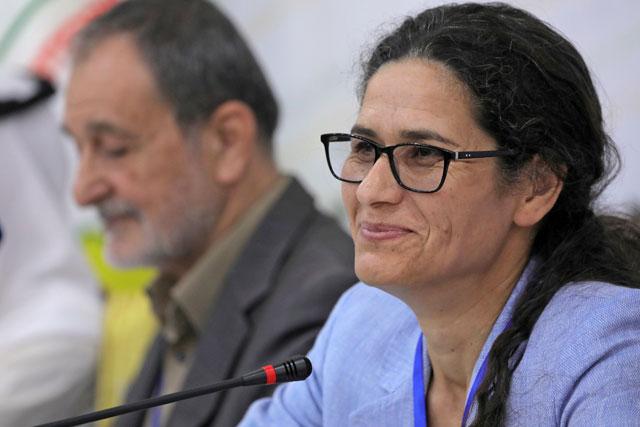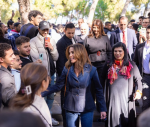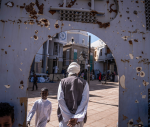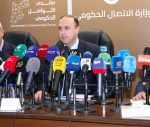You are here
Wary of US ally, Syrian Kurds look to Damascus for talks
By Reuters - Jul 26,2018 - Last updated at Jul 26,2018
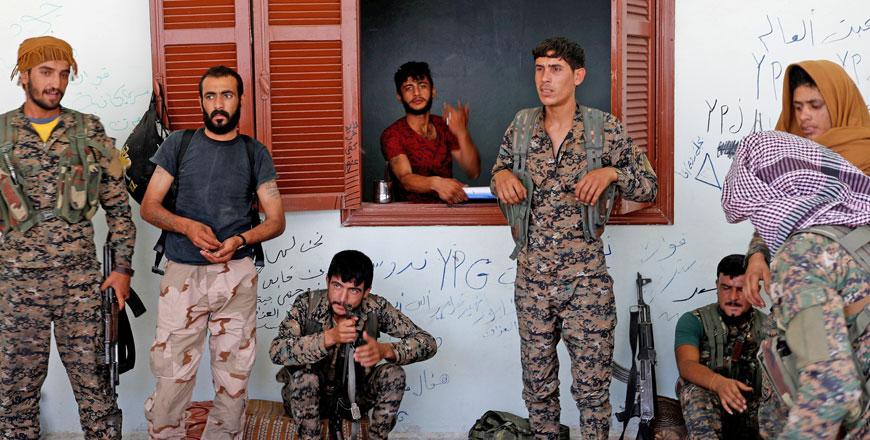
This file photo shows Kurdish fighters from the People’s Protection Units stand outside a house in Raqqa, Syria, June 21, 2017 (Retures photo)
BEIRUT — Syria’s Kurds are trying to forge ties with Damascus as they seek to protect gains made in seven years of war, wary of its unpredictable US ally and more ready than ever to negotiate with President Bashar Assad.
The main Kurdish groups have emerged among the few winners of the conflict in Syria, carving out autonomous rule over large parts of the north under the control of the Kurdish-led Syrian Democratic Forces (SDF) militia.
They have mostly avoided conflict with Assad, at times even fighting common foes — including rebels his forces are gradually crushing with help from Russia and Iran.
Talks between the Syrian Kurds and Damascus have now begun on a return of state employees and repairs to one of Syria’s most important pieces of infrastructure: the Tabqa dam, the country’s largest, which the SDF took from Daesh last year with US air power.
A top Kurdish official has also signalled the fighters could join any future offensive against rebels holding Idlib province bordering Turkey, and cooperate more widely against Turkey, which has sent forces into an arc of Syria’s northwest.
A decision to stop calling their police force by its Kurdish name, “Asayish”, is another step that appears aimed at overhauling the region’s image with an eye to its future.
Syria’s Kurds, which the Baathist state systematically persecuted for years, say they do not seek independence, but they hope a political deal will safeguard their autonomy.
For the first time, Assad said in May he was “opening doors” for talks with the SDF, while also threatening force. A deal between them could settle the conflict in most of Syria.
But there is no sign of Damascus coming to the table yet, and analysts say Assad is in no rush as he has fast recovered ground and his position is growing stronger.
“We have a conviction that channels must be open... the constitution, the political process, these will not be solved without the regime,” said Ilham Ahmed, a senior Kurdish official in the SDF’s political wing. “The regime is not going anywhere.”
What America wants
With the Kurdish YPG militia at its forefront, the SDF holds around a quarter of Syria, the biggest chunk outside state control. About 2,000 U.S. forces are deployed in the region across the north and east, rich in oil, water and agricultural land — important leverage for the Kurds.
The YPG joined forces with the United States more than three years ago, becoming its main Syrian partner in the fight against Daesh. The alliance flew in the face of US ties with NATO member Turkey, which views the YPG as terrorists linked to the Kurdistan Workers Party (PKK).
Washington has avoided making any political promises to the Kurds and opposes their autonomy ambitions. Conflicting US statements over Syria have put them on guard, and they worry Washington may ultimately put its ties with Turkey first.
US President Donald Trump said in April he wanted to withdraw troops from Syria soon, while tempering that by expressing a desire to leave a “strong and lasting footprint”.
Other US officials have played down the odds of a withdrawal any time soon. The US military has at times used lethal force to defend SDF territory against pro-government forces.
“It’s not clear what they want,” Ahmed told Reuters.
The SDF has become wary, especially after an “American silence” during a Turkish offensive on Syria’s Kurdish Afrin region this year. “We felt let down,” she said.
Despite this, she said the deployment of US forces in nearby Manbij sent a strong message after Turkey threatened to march on the town.
Henri Barkey, an international relations professor at Lehigh University in the United States, said US policy has pushed Kurdish leaders towards Damascus.
“If you’re a Syrian Kurd, you have to think about the day Trump decides to withdraw,” he said. “You have a president who can change his mind and order policies that are completely contradictory.”
Police force ‘for everyone’
Syrian Kurdish leaders have moved more cautiously than Kurds across the border in Iraq who voted for independence in a referendum last year. The vote, which Washington opposed, plunged them into crisis and regional isolation. Eventually, they were forced to backtrack.
Last year, the Kurdish-led authorities in north Syria embarked on elections to set up governing bodies based on the political ideas of PKK leader Abdullah Ocalan. But they have now indefinitely postponed the final stage of the election.
Analysts say friction with pro-Damascus Arab tribes poses a challenge to the Kurdish forces, and Assad may seek to benefit from the discord.
Pictures of Ocalan, revered by the YPG, were taken down last month in Qamishli, a city it controls on the border with Turkey. A local municipal statement said this was to “beautify and organise” the streets.
Last week, the region’s police changed its name and flag, a move which leading Kurdish politician Aldar Xelil said was “out of consideration” for Arab cities the SDF seized from Daesh including Raqqa, which had been the militants’ Syrian capital.
“This way the [police] force will be for everyone,” he said.
Syrian state officials have highlighted Raqqa as a key target for “liberation” from foreign occupiers — a reference to American forces. An SDF-backed council now runs the city, much of which was destroyed by months of US air strikes.
Critics say US recovery aid has fallen short
Fixing the hydroelectric Tabaqa dam near Raqqa is a top priority. Without the government’s help, restoring it would need major foreign aid, Ahmed said. Talks over collaborating on health and education could follow.
“It could pave the way, play a positive role in growing trust for us to take it a step further,” he said.
Related Articles
BEIRUT — The future of Kurdish-led areas of northern and eastern Syria has been thrown into doubt by President Donald Trump’s decision to wi
BEIRUT/ISTANBUL — Fighting between Turkey and Kurdish militias in northern Syria is complicating plans to drive their mutual enemy the
TABAQA, Syria — The political arm of the Syrian Democratic Forces (SDF) militia said on Monday it would work to set up a unified administrat



